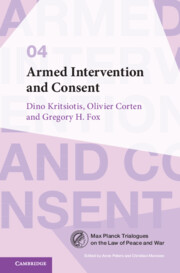At the time of writing of this preface, the war launched by Russia against Ukraine has been raging for almost one year, causing unspeakable suffering. In its letter to the UN Security Council, dated 24 February 2022, Russia pointed, among other things, to an appeal made by the so-called People’s Republics of Donbass to Russia for help.Footnote 1 However, the primary explanation and ‘justification’ of the invasion has been self-defence, not the supposed invitation. This is visible in both the form (an Article 51 letter) and the substance of the document submitted to the Council. None of the reasons given in that letter is a valid legal justification for this invasion, which remains a blatant violation of the prohibition of the use of force, in its aggravated form: aggression.
The ongoing war in Ukraine will likely change the legal framework within which the use of force is broadly conceived – notably, in relation to the role of the Security Council and the aggressors’ criminal responsibility. But despite the alleged invitation by ‘Republics’ that the overwhelming majority of states do not recognise, this horrible war changes none of the findings presented in the ensuing chapters. All materials gathered here remain current as of 31 January 2022.
This book is the fourth Max Planck Trialogue on the Law of Peace and War. The three preceding volumes of the series deal with self-defence against non-state actors,Footnote 2 the law applicable to armed conflict,Footnote 3 and reparation for victims of armed conflict.Footnote 4 The trialogue format responds to the current volatile state of the international legal order. A shift of economic and political power, a changed intellectual climate, and new ideas are challenging the economic, political, military, and ideational dominance of the West. The international legal order is characterised by a ‘securitisation’ and by renewed competition among the great powers.
All this has an impact on the international law governing the use of force and surrounding armed conflict. In that field of the law, deep-seated differences arise in the legal assessment of problems – such as interventions with consent of the territorial state. This is understandable because states must take existential decisions and the issues are highly value-loaded. This means that sourcing ‘correct’ solutions through purely doctrinal scholarship is not easy and may even be impossible. Such a state of affairs warrants more reflection on our scholarly premises and methods – and that is exactly the aim of the Max Planck Trialogues. The trialogue format accommodates the pluralism and changing values of the current era – of a shifting world order, and a rise of nationalism and populism. It brings to light the cultural, professional, and political pluralism that characterises international legal scholarship, and it exploits this pluralism as a heuristic device. We have called this approach ‘multiperspectivism’.Footnote 5
The multiperspectivism of this volume does not flow from geographical or gender diversity: all authors are ‘Western’-educated men. Rather, the authors employ distinct and diverse scholarly methods: a deep historical and conceptual analysis in Chapter 1 (Dino Kritsiotis); a rich description, coupled with critical positivism, in Chapter 2 (Olivier Corten); and a large-N study, with quantitative methods, in Chapter 3 (Gregory H. Fox).
As with the preceding volumes, this work was kicked off – in 2018 – with an expert workshop, at which Veronika Bílková, Theodore Christakis, Larissa van den Herik, Eliav Lieblich, Achilles Skordas, Antonello Tancredi, and Erika de Wet delivered valuable input. The workshop also generated ‘Impulses’: short essays by the participants, published as ‘Intervention by Invitation: Impulses from the Max Planck Trialogues on the Law of Peace and War’, in Zeitschrift für ausländisches öffentliches Recht und Völkerrecht/Heidelberg Journal of International Law 79 (2019), 633–711.
We are thankful to all those who contributed to the workshop and for all support in the later phases. A team of student assistants searched documents, retrieved books, and helped to style footnotes. We are indebted to Ms Verena Schaller-Soltau for editorial support and to Vanessa Plaister for superb copy-editing. Last, but not least, we thank Anette Kreutzfeld, whose oversight and engagement, always with diligence, circumspection, and equanimity, has supported this project in countless ways.
1 Letter dated 24 February 2022 from the Permanent Representative of the Russian Federation to the United Nations, addressed to the Secretary-General, containing, as an annex, the text of the address of the President of the Russian Federation, Vladimir Putin, to the citizens of Russia, informing them of the measures taken in accordance with Article 51 of the Charter of the United Nations in exercise of the right of self-defence (UN Doc. S/2022/154).
2 Mary-Ellen O’Connell, Christian Tams and Dire Tladi, Self-Defence against Non-State Actors, Max Planck Trialogues on the Law of Peace and War (Anne Peters and Christian Marxsen, series eds), vol. 1 (Cambridge: CUP 2019).
3 Ziv Bohrer, Janina Dill and Helen Duffy, Law Applicable to Armed Conflict, Max Planck Trialogues on the Law of Peace and War (Anne Peters and Christian Marxsen, series eds), vol. 2 (Cambridge: CUP 2020).
4 Cristián Correa, Shuichi Furuya and Clara Sandoval, Reparation for Victims of Armed Conflicts, Max Planck Trialogues on the Law of Peace and War (Anne Peters and Christian Marxsen, series eds), vol. 3 (Cambridge: CUP 2020).
5 Anne Peters, ‘Introduction to the Series: Trialogical International Law’, in O’Connell et al., Self-Defence against Non-State Actors (Footnote n. 2), XI–XXV.

